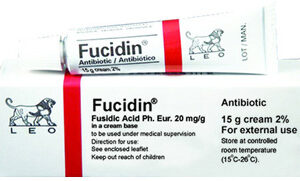Bactroban Essentials
Bactroban contains mupirocin, an antibiotic that prevents bacteria from growing on your skin. It is not for those who need to treat infections that have spread deeply into the skin or other parts of the body. Bactroban is particularly adept at treating skin infections like impetigo or minor infections resulting from small cuts, scrapes, or burns.
Indications
Bactroban is indicated for the treatment of certain skin infections such as secondary infected traumatic skin lesions including small lacerations, sutured wounds, or abrasions. It is also often prescribed for primary skin infections like impetigo, a common and highly contagious skin infection that mostly affects children.
Dosage Administration
To correctly use Bactroban, a thin layer should be applied to the affected area three times a day. The duration is usually up to 10 days, depending on the response and clinical condition of the patient. No dilution or occlusive dressing is necessary, although a gauze dressing that doesn’t stick to the skin can be used.
Contraindications
Bactroban should not be used by individuals with a known hypersensitivity to mupirocin or any of the excipients in the formulation. Precaution should be taken in patients with moderate to severe renal impairment. Extended use may result in the growth of nonsusceptible microorganisms, including fungi.
Adverse Effects
Though many patients tolerate Bactroban without serious issues, some experience adverse effects. Common ones include headache, burning or stinging, and itching at the application site. In rare cases, more severe reactions like allergic urticaria, angioedema, and systemic anaphylactic reactions may occur.
Drug Interactions
While Bactroban does not typically interact with systemic medications, since it is used topically and does not circulate throughout the body in large amounts, it’s always a good idea to discuss any other skin preparations you’re using with your healthcare provider.
Population Specifics
Pregnant or breastfeeding women should only use Bactroban if the potential benefit justifies the potential risk to the fetus or child. Safety and effectiveness for children under the age of three months have not been established.
Safety Storage
Bactroban should be stored at 20 to 25 degrees Celsius (68 to 77 degrees Fahrenheit). Tubes should be kept tightly closed, and like all medications, Bactroban should remain out of reach of children.
Clinical Properties
Clinically, Bactroban inhibits bacterial protein synthesis by reversibly and specifically binding to bacterial isoleucyl transfer-RNA synthetase. Due to its unique mode of action, it is an invaluable agent in treating bacterial infections of the skin.
Supply Handling
Bactroban comes in tubes of various sizes and should be dispensed to patients with clear instructions on storage and expiration. Partially used tubes should be discarded once the course of treatment is complete.
Patient Information
Patients should be apprised of the importance of completing the full course of therapy. They should also understand the symptoms of an allergic reaction and be instructed to seek immediate help if they experience such symptoms.
FAQs on Bactroban
Patients often have several queries regarding Bactroban, such as its non-suitability for fungal or viral infections, the importance of not using it on large areas of damaged skin, and the necessity to avoid contact with the eyes, nose, mouth, and other mucous membranes.

Reviews
There are no reviews yet.